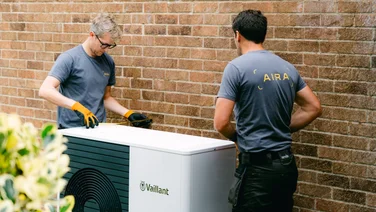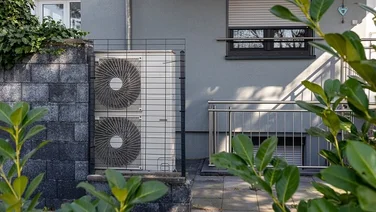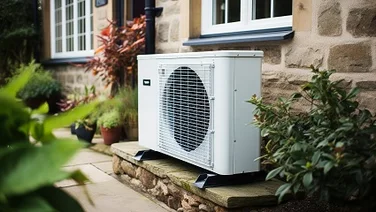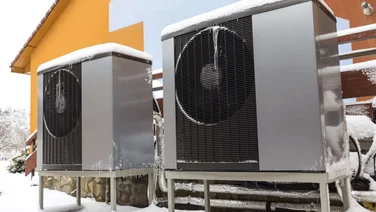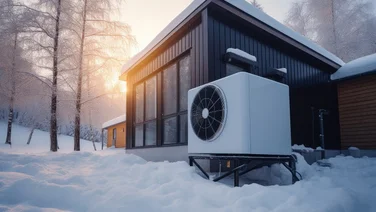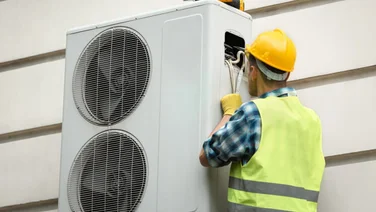We receive a small fee from trusted installers when you request a quote through our site. This helps us keep our content independent, well-researched and up to date – Learn more
- What is a high temperature heat pump?
- What are the pros and cons of high temperature heat pumps?
- How do high temperature heat pumps work?
- How much more expensive are high temperature heat pumps?
- What grants are available for HT heat pumps?
- What are the average running costs of a high temperature heat pump?
- Is it true that high temperature heat pumps are less efficient?
- What high temperature heat pumps are available in the UK?
- Should I get a high temperature heat pump?
- How do I know if my home is suitable?
- What annual maintenance is required?
- Next steps
- High temperature heat pumps produce hotter water and higher heat outputs than standard air source heat pumps
- The Daikin Altherma 3 HT, Mitsubishi Ecodan R290 and Octopus Cosy are popular high temp options
- These heat pumps are ideal for older, uninsulated homes with existing radiators

High temperature (HT) heat pumps are air source heat pumps that generate water as hot as a conventional boiler (75°C to 80°C). This makes them an ideal retrofit solution for older, uninsulated homes because they can often work with your existing radiators.
Most standard heat pumps heat water to around 60°C. High temp heat pumps, however, can reach 75°C or even 80°C – just like a boiler.
HT heat pumps have other advantages. They’re quicker and easier to install than their lower temperature counterparts, often working with your existing radiators and requiring no extra insulation.
It can take a couple or hours for the outdoor unit’s power connection after the main installation is complete.
HT heat pumps tend to cost more than lower temp models, but the gap is narrowing as heat pump costs fall. What’s more, their easier installation keeps costs down.
If you’re interested in learning more about the best air source heat pumps in the UK, please read our dedicated guide.
Could a high temperature heat pump be your ideal low-carbon boiler replacement? Here we’ll run through their pros, cons and costs to help you decide.

Get £7500 towards your heat pump installation through a trusted installer
An MCS-certified heat pump installer can apply for the Boiler Upgrade Scheme on your behalf, get a quote from one now
What is a high temperature heat pump?
A high temperature (HT) heat pump is an air source heat pump designed to reach water temperatures of 75°C to 80°C—matching the output of a conventional boiler. This is significantly higher than most standard heat pumps, which typically reach only 60°C.
- A “high temperature” heat pump is one that’s capable of raising its flow temperature above 65°C, according to a government report.
- The best HT heat pumps can reach 80°C, just like gas boilers. Many standard heat pumps currently only reach 45°C to 60°C.
- HT heat pumps also tolerate extreme outdoor temperatures better than lower temperature heat pumps, so they generate high heat in the depths of winter.
- Popular HT heat pumps include the Daikin Altherma 3 HT and Mitsubishi Ecodan, which feature in our list of the best heat pumps currently available.
- Some of the newest heat pumps can be installed as high temperature or low temperature heat pumps. Octopus Energy’s Cosy range, for example, comes with Eco (low temp) and Turbo (high temp) installation options.

What are the pros and cons of high temperature heat pumps?
Here’s a quick overview of the main advantages and disadvantages of high temp heat pumps:
- Heating and water: as hot as a conventional boiler
- Installation cost: often cheaper than for a standard heat pump
- Radiators: no need to install new ones
- Insulation: you won't need as much of it
- Efficiency: the best HT heat pumps are just as efficient as standard heat pumps
- Eco-friendly: HT refrigerants are the greenest available
- Extreme weather performance: very hot water even when it's well below -20°C outside
- System cost: HT models tend to cost more upfront than standard heat pumps
- Running costs: can be higher than lower temp heat pumps
- Size: often bigger and heavier than standard heat pumps
How do high temperature heat pumps work?
High temp heat pumps work in much the same way as their lower temperature cousins. They extract heat from the air outside, even when it’s freezing cold, and heat it using compressors and refrigerants. Then they deliver hot water into your home’s radiators and water tank.
What makes HT heat pumps different is the refrigerants they use, plus a couple of extra processes in the heating cycle. Here’s a quick guide.
Better refrigerants
Most HT heat pumps use R290 or R32 refrigerants. These chemicals are better for your home and the environment than older refrigerants. They can produce higher output temperatures, and are more tolerant of extreme outdoor temperatures.
“A refrigerant is a liquid that conveniently evaporates at a certain temperature,” explains Christopher Wood, associate professor of engineering at Nottingham University. “With conventional refrigerants, efficiency drops dramatically as the temperature goes higher. A high temperature heat pump (uses) a refrigerant that can do this at a higher temperature.”
Cascade system
“Cascade” heat pumps use two cycles – one low temperature, and one high temperature – each with a different refrigerant.
In the first cycle, the refrigerant evaporates at a very low temperature and condenses to create heat at a relatively low pressure and temperature. Heat then moves to the evaporator, which makes the high temperature refrigerant evaporate. The second refrigerant then condenses at a still relatively low pressure, keeping the heat output high.
Enhanced Vapour Injection (EVI)
EVI adds another loop to the heat pump cycle. A small amount of condensed refrigerant leaves through an expansion valve into a counterflow heat exchanger. This results in a superheated vapour that can then be injected into the compressor, increasing the heating capacity.
This process uses more electricity but increases heat output by an even greater amount, so it actually increases the heat pump’s efficiency.
If you want to know about heat pumps, read our dedicated guide.
Sorption heat pumps
Sorption heat pumps are a type of gas-fuelled HT heat pump that use natural refrigerants and sorbents to absorb refrigerant vapour. This process results in a hotter output and a smaller carbon footprint. Sorption heating technology is relatively new, and these pumps are not yet widely available in the UK.
What type of central heating do you currently use?
Get startedCASE STUDY: What’s it really like to own an air source heat pump?
South London resident Louise had a 12 kW heat pump installed to reduce her reliance on fossil fuels. She received £5,000 through the Boiler Upgrade Scheme, and now enjoys consistent warmth throughout the house.
Read our full interview with Louise to find out more.
How much more expensive are high temperature heat pumps?
We’re noticing that the price gap between high temperature and lower temperature heat pumps is closing. This is partly because technology is evolving fast, and partly because the demand for HT heat pumps is rising.
A couple of years ago you might have paid between £11,000 and an eye-popping £42,000 for a high temperature heat pump. That’s not longer the case.
The cost of an Octopus Cosy heat pump with Turbo (High temp) installation now starts at just £4,300.
“A high temp heat pump comes with lower installation costs and minimal changes to plumbing and less disruption,” Octopus Energy’s Becky Boulton told The Eco Experts. “Installation only takes around two to three days. And it works with existing radiators, reducing the need for larger replacements.”
The main downside, she admits, is higher running costs for high temp heat pumps. However they produce more heat, so you get more bang for your buck.
READ NEXT: Octopus Energy review
What grants are available for HT heat pumps?
Customers in England and Wales can make use of the Boiler Upgrade Scheme (BUS) to get £7,500 towards an HT heat pump.
There were over 4,000 applications in October 2025, and the scheme was expanded in November 2025 to include air-to-air heat pumps and heat batteries.
In Scotland, the Home Energy Scotland Grant and Loan offers up to £15,000 for heat pumps, divided into £7,500 for a grant and £7,500 for a loan.
What are the average running costs of a high temperature heat pump?
According to E.ON Next, The average running cost of a HT heat pump is around £450-£1,200 annually. This is dependent on factors including the size of your home and your heating preferences.
So, how much more expensive are they to run compared to a boiler? Based on fuel prices from July 2025, an old (G-rated) gas boiler would save you roughly £260. Data from Energy Savings Trust estimates that using a new (A-rated) gas boiler would actually lose you around £40 annually.
Is it true that high temperature heat pumps are less efficient?
Not any more. A HT heat pump does cost more to run than a lower temperature heat pump, but it produces hotter water all year round. This means the energy it generates is many times more than the energy it takes to run.
The latest HT models boast COP (coefficient of performance) efficiency ratings as good as their lower temperature counterparts, with some, like the Daikin Altherma 3 HT, achieving efficiency ratings of around 450%. In other words, it produces about four and a half times the amount of energy than it takes to run.
What high temperature heat pumps are available in the UK?
Many of the best air source heat pumps are high temperature models, or available with an HT installation. Here are a few examples:
- Mitsubishi Ecodan R290 (5-12kW models) – the newest heat pump in the Ecodan series produces water as hot as 75°C
- Daikin Altherma 3 HT (6-12kW models) – can supply water up to 70°C
- Octopus Cosy (6kW and 9kW models) – Octopus Energy‘s popular model produces water as hot as 65°C with a Turbo installation

Another major player we’re likely to see soon is Vattenfall, a Swedish state-owned heat pump company. Vattenfall has already rolled out its 60°C to 80°C machines in the Netherlands.
“The high temperature heat pump solution is innovative and simple to install,” said Vattenfall’s commercial director, Mark Anderson. “It could be the solution to help decarbonise homes in the UK that are heated using traditional gas boilers.”
Should I get a high temperature heat pump?
If you want to swap your boiler for a more sustainable, future-proof heating system – without sacrificing temperature or efficiency – then yes, go for a high temperature heat pump.
HT heat pump systems are no longer significantly more expensive than their lower temp counterparts. Although they cost more to run than less toasty heat pumps, the heat they produce means their energy efficiency is excellent.
If you live in an older house without new insulation, and you don’t want to get rid of your existing radiators, then a HT heat pump is an especially wise choice. They produce extremely hot water even in the depths of winter, and many even have air conditioning functions to help you stay cool in summer.
How do I know if my home is suitable?
Most homes are suitable for a high temperature heat pump. In fact, more homes are suitable for HT heat pumps than for lower temperature heat pumps, because you won’t have to upgrade your insulation or radiators.
High temp heat pumps are also a good option for listed buildings, off-grid properties and older, draughty homes.
Despite this, we still recommend that you insulate your home as well as possible. Insulation cuts your energy costs – including heat pump running costs. It remains the best way to improve your home’s energy efficiency and limit your heating bills. See our guide to home insulation costs for more.
What annual maintenance is required?
The typical lifespan of an HT heat pump is around 15 – 20 years. To see it through to the higher end of this range, we suggest you schedule maintenance by an MCS (Microgeneration Certification Scheme) qualified engineer.
It is also recommended that you check your unit every few months to make sure that airflow isn’t restricted. This involves cleaning away any debris that may have built up, especially over the winter months, as well as cleaning the filters.
Next steps
Your next step is to gather free quotes – and we can help here, too. Enter a few details in our heat pumps quote-finder tool and we’ll ask our trusted installers to get in touch. You won’t be under any obligation to take them up on their offers, but you’ll have a much better idea of your options.


